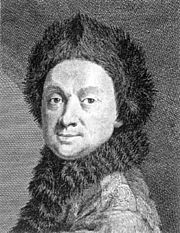Pierre-Louis Maupertuis facts for kids
Quick facts for kids
Pierre Louis Maupertuis
|
|
|---|---|

Maupertuis, wearing "lapmudes" from his Lapland expedition
|
|
| Born | 17 July 1698 |
| Died | 27 July 1759 (aged 60) Basel, Switzerland
|
| Nationality | French |
| Known for | Principle of least action, precursor of transmutation |
| Scientific career | |
| Fields | Mathematics, physics, biology, metaphysic, moral philosophy, astronomy, geography |
| Institutions | French Academy, Berlin Academy |
| Influences | Leibniz, Newton, Descartes, Malebranche, Harvey, Berkeley |
| Influenced | Euler, Buffon, Diderot, Kant |
Pierre Louis Moreau de Maupertuis (born 1698 – died 1759) was a very smart French person. He was a mathematician, a philosopher, and a writer. He led important science groups in France and Germany.
Maupertuis helped us understand the world better. He traveled to a cold place called Lapland. He also came up with a big idea in physics about how things move. He even thought about how living things change over time.
Contents
Who Was Pierre Maupertuis?
Pierre Louis Moreau de Maupertuis was born in Saint-Malo, France. This was on July 17, 1698. He grew up to be a very important thinker. He studied many different subjects. These included mathematics, physics, and biology. He also studied astronomy and geography.
Leading Science Groups
Maupertuis became a leader in the world of science. He was the Director of the French Academy of Sciences. This was a top science group in France. Later, he became the first President of the Prussian Academy of Sciences. This was in Germany. Frederick the Great, the king of Prussia, invited him to lead it.
Exploring the Earth's Shape
One of Maupertuis's most famous trips was to Lapland. This is a very cold region in northern Europe. He went there to figure out the exact shape of the Earth.
Before this, scientists wondered if the Earth was perfectly round. Some thought it was a bit flattened at the poles. Others thought it bulged there. Maupertuis's team measured a long distance in Lapland. Their findings helped prove that the Earth is indeed a bit flat at the poles. It is like a slightly squashed ball.
Big Ideas in Science
Maupertuis had many important ideas. One of his most famous is the principle of least action. This is a rule in physics. It says that when something moves, it takes the easiest path. It's like a shortcut. This idea is also known as Maupertuis's principle. It helps scientists understand how physical systems work.
Thinking About Life
Maupertuis also studied natural history. This means he looked at how living things work. He thought about heredity. This is how traits are passed from parents to children. He also wrote about the "struggle for life." This is the idea that living things compete to survive. These ideas were very new for his time. They are still important in modern science today.
Maupertuis died on July 27, 1759, in Basel, Switzerland. His work helped shape how we understand the world.
Images for kids
-
Maupertuisiana (1753), a book by Voltaire. It makes fun of Maupertuis.
See also
 In Spanish: Pierre Louis Maupertuis para niños
In Spanish: Pierre Louis Maupertuis para niños




